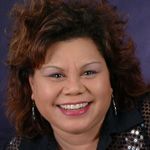
A capital idea
Gold Coast singer-songwriter Toni Janke spent her early years growing up in Cairns, but her favourite memories are of Canberra, where she lived from the age of 10 until she finished high school.
” Dad got another job working for the government,” Toni says, explaining the family’s southern move.
” Canberra was a great place to grow up. It’s very clean, the buses run on time and there are lots of parks and open space. The bad part is it’s really cold.”
Some of Toni’s favourite Canberra memories are of the picnic paradise known as Pine Island. The reserve is in the Canberra suburb of Tuggeranong, and is a popular place for family gatherings, swimming, fishing and barbecues.
She also remembers her family travelling out to the historic village of Tharwa, in southern Canberra, where they would go camping and take in the tranquil surrounds of the ACT’s oldest settlement. The village is named after the Aboriginal word for Mt Tennent and contains the gravesite of the courageous Aboriginal leader, Hong Yong.
” We also had relations who would come to Canberra from Cairns once a year,” Toni recalls. “So we would take them on the standard tour – the War Memorial, Parliament House, the Art Gallery, High Court, National Library and The Mint.”
So did she have a favourite attraction from this list? “I was always waiting for the barbecue part,” laughs Toni.
” Nowadays, I would say that I love seeing Floriade, the flower exhibition around the lake. It’s just so fabulous to see those flowers growing in what is really a dry, semi-barren desert.”
These days, Toni is also busy promoting her fabulous new album, titled Jewel of the North, in which she “tries to capture the tropical feel and essence of north Queensland”.
Amazingly, the album also includes a song she wrote in her bedroom as a 12-year-old.
” The song’s called Without Your Help, and nearly 30 years later it’s just as poignant,” Toni says. “A lot of people can relate to it, although it means something different when you’re 12 as opposed to when you’re nearly 40.”
Toni says she and her sister Terri probably wrote about 500 songs when they were kids “sitting in their bedroom”.
” I was lucky, really,” Toni says. “We had a musical household, with the latest Top 40 stuff to listen to – Dad would go and get us the new single by Abba or whatever. We also had lots of parties with people playing guitar in the lounge room. Both my parents were very sociable people.”
(story 1/12/2004 end)
TO THE BRINK AND BACK
She’s got the voice, the tunes and the lyrics. Now, with the release of a brand new album, she looks set to attract a following to match.
Toni Janke first came to the attention of the Australian music industry some eight years ago when she released her debut album, Hearts Speak Out, on the back of a burgeoning reputation as a consummate acoustic performer. Since then the singer/songwriter has given birth to two children, worked in Indigenous media and married her sweetheart Graham.
Now 36, Toni’s musical career is on the verge of receiving a major boost in the form of a new album. Recorded and produced on the Gold Coast, where she lives, The Brink is undoubtedly a watershed moment for this supremely gifted woman who has been playing the guitar and writing her own material since she was eight.
Nevertheless, with a title like that, one could be forgiven for thinking Toni’s been on the edge of a nervous breakdown for the last eight years. (Hey ” motherhood can be trying!) Was she reduced to scribbling lyrics on the back of an envelope between changing nappies and preparing school lunches?
Toni is quick to qualify. “For me, the album’s title is very much about being on the brink of enlightenment, on the verge of something new. When I sing about being on the brink of realisation, I mean that I’m opening up and coming to understand, like an awakening.”
That awakening is arguably what makes The Brink such a stunning recording. Suffused with a life-affirming spirituality, Toni’s musings about the world and her place in it call to mind both Buddhism’s idea of impermanence and pantheism’s divine Mother Earth.
The judges of the 2001 National Australian Songwriting Contest certainly thought so when they gave her “Child of the World”, which features on The Brink, an award for merit, placing Toni among the top 10 per cent of Australian songwriters. At its core, the album is an evocation of that very human journey from anxiety and confusion to unconditional love of oneself and others.
She is fortunate to have a distinctive voice, too. Clarion-clear and strong as the wind, it is the antithesis of so many of the bloodless, over-produced vocals we hear on the radio these days. While closer to folk in its cadences than anything else, her voice is powerfully resonant and instantly recognisable.
Hailing from Far North Queensland, Toni is proud to have both Aboriginal and Islander heritage. Her mother’s people are Wuthathi from Cape York Peninsula, while her father’s people come from Murray Island (Meriam) in the Torres Strait. Cairns was home until the age of 10, before the family headed south to Canberra when her father secured a government job in media and public relations.
“At that time, Canberra was just beginning to be the hub of government and a lot of Aboriginal families were moving there,” she recalls. “The Perkins family moved in around the corner from us, Bobby Randall would come round and play the guitar at barbeques, and I grew up with people like [artist and curator] Brenda Croft. It was a real cultural network.”
One can almost imagine an adolescent Toni talking boys with Hettie and Rachel Perkins while swapping lipsticks and listening to Sherbet. But you’d be wrong. “Oh, I never talked about boys,” quips Toni. “I always just sat there and played the guitar. My love was for music. I could never really work out the boys!”
Toni went on to study Law at the University of New South Wales in Sydney before doing her article clerkship with a firm back up Cairns way. But after running a heavy caseload involving people “just like myself” getting into trouble with the courts day in, day out, Toni realised that kind of work wasn’t meant for her. So she returned to Canberra and took a job with Robert Tickner, then Minister for Aboriginal and Torres Strait Islander Affairs.
“I was very young, only 24 or 25. Robert was, and still is, an amazing and sensitive man ” he’s very interested in doing things for people and serving in that public role. It was an interesting time, what with Mabo and the setting up of the Reconciliation Council. I was privileged to be part of that era and to meet people I’d probably have never met otherwise.”
All the while, music was calling out to Toni, passionate as a siren’s song. But while her parents were musical themselves ” she grew up listening to traditional Island songs as much as the Bee Gees ” they were also cautious.
“My father was determined to have three boys and three lawyers ” he got two girls and a boy! One of them, my sister Terri, is a lawyer. His attitude to my music was very much along the lines of, “˜You’ll never make a career out of music, it’s just something you can enjoy. You’ve got to get an education because it’s tough out there.'”
Toni knows how tough it is. But for her, music has never been a means to an end ” fortune and success. Rather, music is an end in itself. “It’s a gift. It’s what you have to do. It’s being able to share music with other people, that’s the beauty of it. It would be nice to make money, but I keep telling myself there’s so much more to life than working and money. And there is!”
Like motherhood, for instance. Proud mum of Terri, seven, and Emily, six, Toni is refreshingly honest in her appraisal of the many ways that having children change you. When asked what being a parent has taught her that she never suspected it would, Toni replies, “Just about everything! I never thought it would be so hard and I never thought I would be so tired! It’s a full-time job, literally. But having my two beautiful girls has also made me want to write more, document more.”
In fact, The Brink documents the musical debut of daughter Terri on the song “Sweet Urban Child”. “When we brought Terri in to sing, I thought it would just be for the end of the song. But she sang so wonderfully that the producer said, “˜Let’s feature her right throughout.’ Her voice is just so beautiful and natural, and it’s there forever now.”
Toni’s musical influences are diverse, ranging from Aretha Franklin and Joni Mitchell to Seal and the Badloves. To relax, she likes to listen to her recording of “dolphins squawking”, although these days it’s more likely to be kids’ music emanating from the loudspeakers than anything she’s put on.
And who has the time to put their feet up and listen to music when they’re organising a world tour? That’s right, Toni Janke and Band is setting sail for Europe, North America and possibly Tokyo and Auckland early next year to promote the album and make new friends around the globe.
“I’ve never performed with a full band before, so it’s going to be exciting,” she says. “It’s early days yet but we’ve already got a French drummer, an African bass player and a Maori girl on back-up vocals. Plus we’ve got all these contacts from around the world. Everything is falling into place.
“Philosophically speaking, I believe things happen for a reason and that you’re meant to draw from those experiences. Now is definitely the time for me to be back on my musical path.”
>Deadly Vibe Issue 73 March 2003
Toni Janke, 36, is a singer-songwriter who lives on the Gold Coast. Her latest album is The Brink.
How many children do you have?
I have two beautiful girls, Terri, who is eight, and Emily, seven.
Do your children take after you or are they quite different?
Both girls are very like me in different ways. Fortunately for them, they
only take after me in some things. They love to sing and dance and are
blessed with heaps of natural talent and strong personalities, so I’m sure
they will do well at whatever they want to do in their lives.
How did having children change your life?
In just about every conceivable way, although the most significant change to
my life in having the girls has been a greater sense of purpose and love in
my life. They teach me to find something special in all the little things
that I used to take for granted, and to slow down. They also teach me greatly
about humility and patience. It’s such a challenge explaining things to a seven-
or eight-year-old, like where rain comes from, what dreams mean or even what to
do in certain situations. It’s quite daunting and embarrassing sometimes,
especially when I don’t know the answers myself!
What are the things about motherhood that surprised you?
I’m constantly surprised about how big the job is – it just never
stops. You can’t get sick, you can’t give up or quit. You just have to keep
going, doing your best, day after day, night after night. You don’t get paid
for it and, if you’re like me, you have absolutely no training – so it’s a
lot of trial and error.
I am also surprised how so many mothers cope so well and juggle so much in
their lives. I often think about our own mothers, aunties and grandmothers
who had six, seven or sometimes12 kids to bring up with very little education,
money and support. They never seemed to complain. I always remind myself
that if they could do it, then so can I. I really have nothing to worry about in
this day and age when parenting is made so easy.
What are the biggest challenges in being a mother?
You have to always be patient, loving and never horrible, no matter what –
which sounds easy, but it can be really challenging, especially at 3am or when you’re pushing a wonky shopping trolley around a very crowded shopping centre – all the little monkeys want is chocolate and you feel like screaming!
The other major challenge is being careful not to project too much of my own
emotional rubbish onto my children. I hope that they will grow up with a
strong sense of their own identity and capabilities. If we could only get
out of the way sometimes and let our kids just be themselves, I think they’d
grow into pretty normal, well-adjusted, beautiful individuals.
What things do you consider important to teach to your children? And what
things do you want them to know about their culture?
Culture is really important and a sense of belonging is equally as vital. I
teach my kids about who they are, where they come from and that it is
important to love everyone equally no matter who you are or where you come
from. I teach them to be proud of their culture, that anything is achievable
and within reach.
How do you hope your children grow up?
I secretly hope they never grow up. I wish they’d stay the way they are
forever. What mother ever wants their babies to grow up? But seriously, I
hope they grow up to be independent, loving, kind and courageous, with a
strong sense of right and wrong and that they use their own lives to help
others in whatever way they choose to, with as minimal an amount of pain and
suffering as possible.
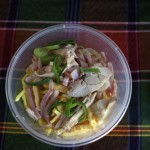
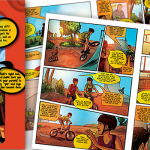
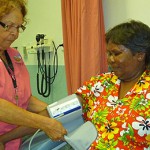
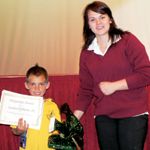

Comments are closed.